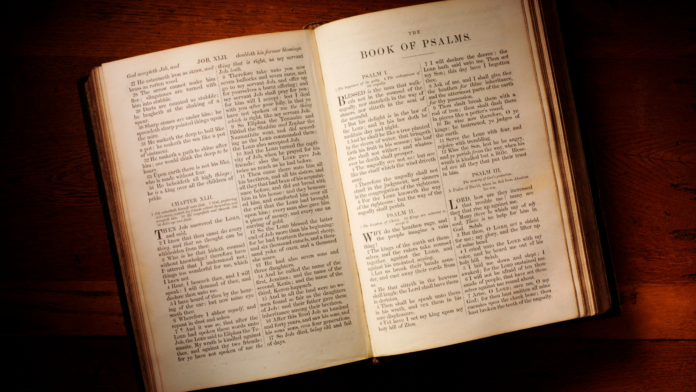One of a thousand reasons the Psalms are so well-loved is that once in a while, we will be reading along and come to a place where that psalm nails a truth so dead-on, we sit there gasping for breath. Case in point, Psalm 50.
You hate instruction and cast my words behind you. When you saw a thief, you consented with him, and have been a partaker with adulterers. You give your mouth to evil, and your tongue frames deceit. You sit and speak against your brother; you slander your own mother’s son.
And then, the clincher:
These things you have done, and I kept silent; you thought that I was just like you.(Ps. 50:17-21)
Thinking that the Eternal God is like us is an ancient tradition with a noble heritage. Every culture has done it, every generation has adapted the art to its own idiosyncracies, every worshiper struggles with the temptation to pull it off.
It’s been said, “In the beginning, God made man in His image. Ever since, man has been returning the favor.”
A couple of decades ago country music legend Johnny Cash paid to have a Hollywood movie made on the life of Christ. In the film, Jesus was depicted as a blue-eyed blonde. I’ve been to the Middle East and the only blue-eyed blondes I spotted were in our tour group. Everyone else, all the natives, seemed to be of a sun-dried dark color with jet black hair.
As prevalent as that is–the way we picture Jesus as looking like someone who would easily blend in with our group–a far worse thing it is to think of God as carrying our own prejudices, hemmed in by our narrow-mindednesses, burdened by our brand of negativities, and limited by our own personal convictions.
The Bible’s favorite word to describe God is needed here. He is holy.
The word “holy,” scholars tell us, means “other than.” God is something else, in the vernacular. He is above us and outside our limitations, far more than we can ever imagine. As the heavens are higher than the earth, so are my ways higher than your ways, and my thoughts than your thoughts.(Isaiah 55:9)
We have been made in the image of God. But we are not like God. Not much. To our everlasting shame.
Let’s talk about this.
It’s worth noting that the Psalm 50 passage we quoted is addressed to one group: “to the wicked.”
Let’s not make the mistake of thinking this is directed toward Gentiles, Moabites, Ammonites, and other assorted pagans. This is talking about God’s own people, many of whom are being called down for their wicked behavior. In fact, earlier (vs. 5), they are referred to as: “my saints” and “those who have made a covenant with me by sacrifice.”
Then, as now, the Lord expects better things out of His own children. The standards are higher for them because they have been given so much.
The Lord takes His people to task for several affronts–in our text, He mentions a disregard for God’s word, thievery, adultery, evil-speaking, and mistreatment of brothers–as well as their tendency to try to placate Him with offerings when their sins are so obvious and not being dealt with.
Norman Vincent Peale used to tell of the time when he was 10 years old and had found half a cigar which he proceeded to smoke. Just at that moment, he spotted his father coming down the sidewalk toward him. There was nothing to do but to hide the smoking material behind him and try to divert the father so he would not notice.
“Father,” young Vincent called out, “there’s a circus in town! Could you please take us? Please?” The senior Peale said calmly, “Norman, never make a plea for grace when you are hiding a smoldering disobedience behind your back.”
We love the way the Lord dismissed their attempts to bribe Him with generous offerings: “If I were hungry, I would not tell you; For the world is mine, and all its fullness.”(Ps. 50:12).
The sin of the casually religious–and that’s what these people were–is to take God’s silence as something other than what it was.
God meant His silence as time for them to repent; they saw it as approval of their behavior.
God meant His patience as a evidence of His love; they saw it as a weakness of His standards.
God meant His grace as a merciful favor to undeserving sinners; they saw it as evidence of God’s laxity and proof of their goodness.
This week I listened to the televised broadcast of a former long-time senator who died recently. What struck me was how easily religious words were applied to this politician who, it appeared to me, did not deserve them. A priest called him “a man of God,” but not for his piety or relationship with the Almighty, but more for other lesser traits.
The obituaries in our local newspaper will print whatever the family or friends will pay for, it appears. That’s why almost every person who dies in this city “was received into heaven on Thursday night by a legion of angels,” or other such flowery prose. No one around here lives a godless life and dies without the Lord, we judge by the obits.
I am not advocating publishing death-notices in which we send people to perdition, in case anyone wonders.
I’d just like a little more truth-telling in these things. If the guy had no use for God, then leave the Almighty out of the obituary and his memorial service. If he never went to church, then don’t have his funeral there but instead consider asking the local justice of the peace to hold the service in a local American Legion hall.
If we’re not going to believe, the least we could do is have the strength of our lack of convictions and be consistent.
Mark Buchanan’s book “Your God is Too Safe” took up the issue of the one-dimensional way we look at God a few years back in a fascinating way. Right now, a friend and I are working our way through the book, the second time for me. (Buy it used at www.alibris.com for a pittance; it could be the best investment you make this year.)
One reason we who call ourselves disciples of the Lord Jesus Christ are continually urged to develop personal habits of daily, consecutive Bible reading is to hear all that God says to us in His word and not just the parts we are already familiar with.
But as He who called you is holy, you also be holy in all your conduct, because it is written, “Be holy, for I am holy”(I Peter 1:15-16).







